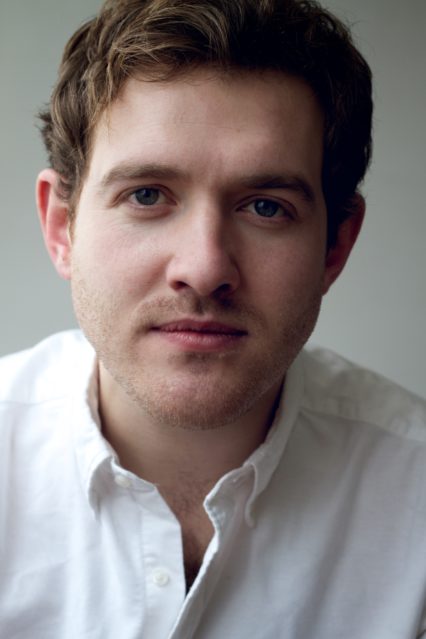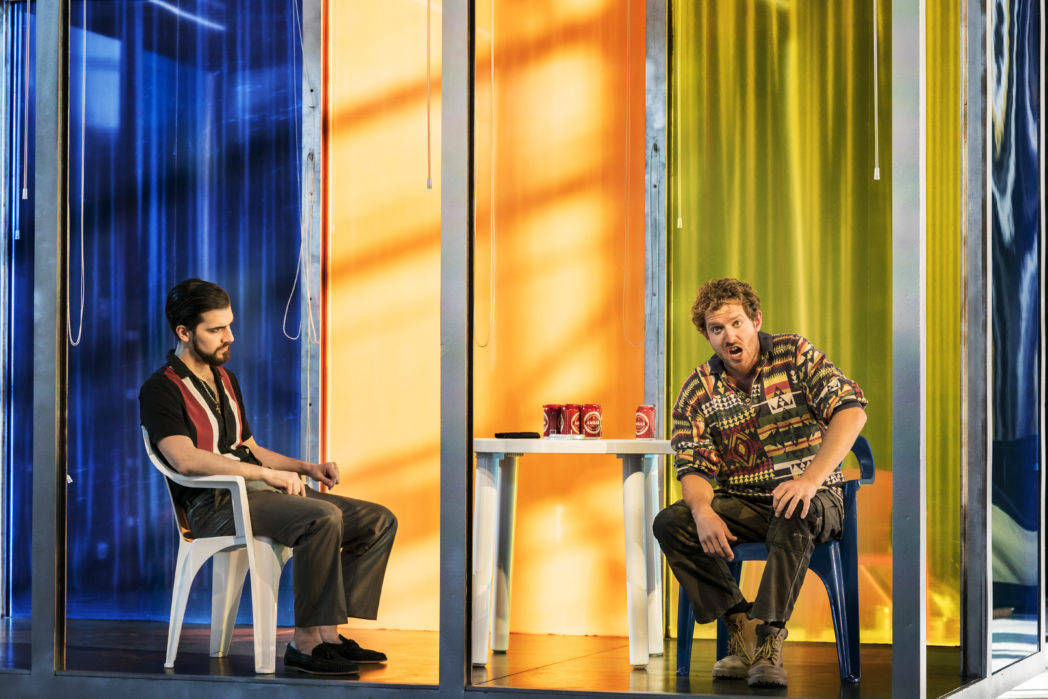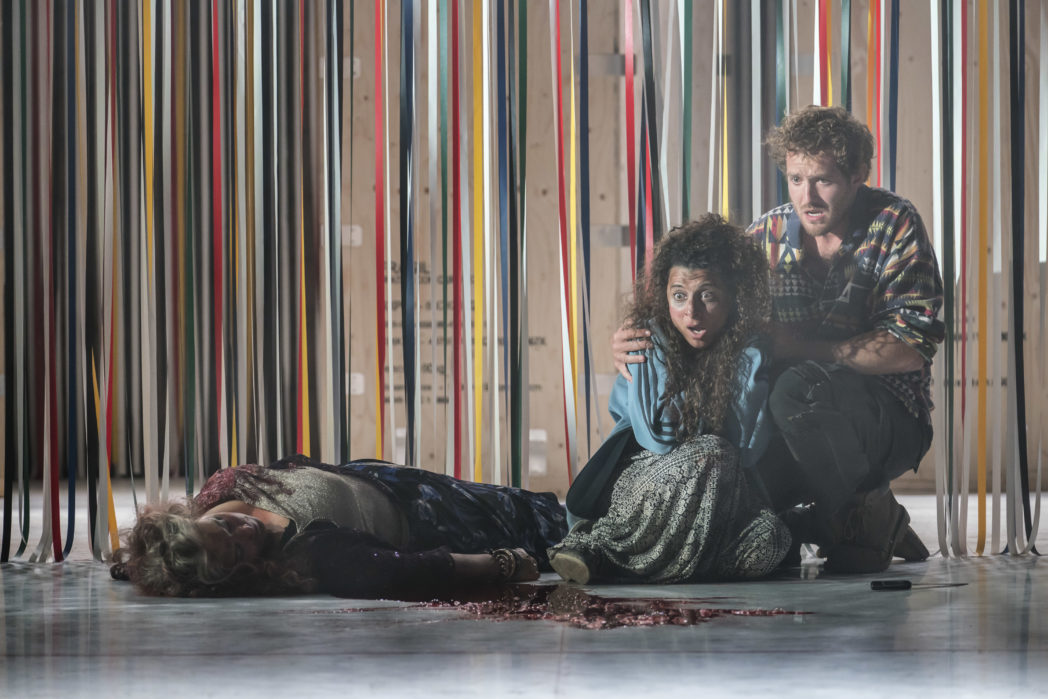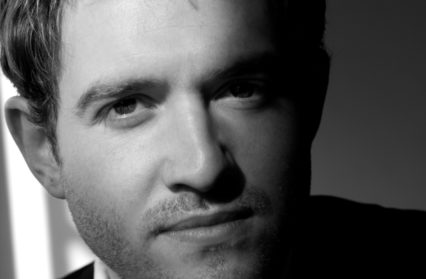Cardiff-born tenor, Sam Furness, discovered the joys of singing at the age of six. He was a chorister at Llandaff Cathedral for many years. Now just 32, he is garnering accolades for his operatic roles, including most recently that of Gaspar in David Sawer’s The Skating Rink at Garsington Opera, due to be broadcast on BBC Radio 3 this autumn: 6 October. He discusses his career with Linda Christmas, ahead of singing the role of The Defendant in Gilbert and Sullivan’s celebrated Trial by Jury in a concert performance at the BBC Proms tomorrow, Sat 1 September, Alexandra Palace, London and broadcast live on Radio 3.
It took a mere £5 to turn Sam Furness into an opera singer. When he was 15 his mother dragged him to a family matinee of La Bohème at Welsh National Opera in Cardiff. A love-soaked opera did not immediately seem the ideal outing for a trumpet-playing, macho 15 year-old boy. But Furness says, “I remember being in tears at the beauty of it. I knew already I could make the sound that the tenor was making. And at the end I said to my Mum this is what I want to do … be an opera singer. I have identified as a singer ever since.”
Sam Furness, as is clear from that quote, has been sure-footed from an early age and now, at 32, has critics describing him as “a lyric tenor clearly going places” – or even blessed with “all the makings of a star”. That he has a voice is a given, but he can also act, has advantageous good looks, is artlessly talkative and deeply musical – provided you don’t mention the piano.

“My godmother was a piano teacher, so I got sent for lessons with her when I was six. And she quickly realised that I was rubbish at the piano and very lazy with it, so she used to make me sing and she would accompany me. Her sons were in the choir of Llandaff Cathedral parish choir and she suggested I join them. It was only once a week; an early morning Sunday service. I was about six or seven. I did that for a couple of years and then I decided I wanted to join the main cathedral choir. My memories are hazy but I think it was because I didn’t want to be in the second-best choir – I wanted to be in the best. But that meant seven services a week. My parents were not that keen. They thought I would miss out on a childhood. I also said I wanted to be a boarder and Mum was not too happy about that either!
“To be a member of the cathedral choir you had to play an instrument – so I chose trumpet because I fancied a girl called Rebecca, and she played the trumpet! I was nine. Trumpet was my main thing until I was about 15. I did Grade 8 within two and a half years, then the diploma when I was 14. I got a music scholarship to Charterhouse through my trumpet playing. I really didn’t want to sing any more. I loved it deep down but it wasn’t cool to sing in the choir, and I only did it because my scholarship depended on it.”
After the epiphanic La Bohème, Sam’s attitude to the choir changed, and along came singing lessons and a choral scholarship to St. John’s, Cambridge.
“It’s true my Dad went there, but that’s not the reason I chose it. John’s has the best choir. Then, now, always. No, not King’s. I prefer the sound of John’s: they sing with a bigger, warmer sound. King’s is a bit pernickety for me. I was singing with vibrato which would have been crushed at King’s whereas it was encouraged at John’s. If you look at history of the last 30 or 40 years John’s make more operatic voices than Kings. King’s tend to produce more Lieder singers. I read theology because I loved it at school and had great teachers. Music at Cambridge was too academic, too theoretical for me. I didn’t fancy writing fugues. I wanted to sing opera! I did seven or eight operatic rolls by the time I left Cambridge.”
He stayed a fourth year and overlapped with his brother, Jack, who also got a choral scholarship to Gonville and Caius, formed his own opera company, Shadwell, and is now a director of opera. For the first time, on September 1, they have been booked to do a show together: Sam singing and Jack directing a performance of Trial by Jury, as part of the BBC Proms season in the newly renovated theatre at Alexandra Palace. It will be the first show that has been done there for 80 years.
For the past few years Sam has been a firm favourite at Garsington Festival. He has sung Jaquino in Fidelio, Baron Lummer in Intermezzo and Jack in the community opera, Silver Birch, by Roxanna Panufnik and librettist Jessica Duchen. This summer he added two more roles: Flamand in Capriccio and Gaspar in the world premiere of David Sawer’s The Skating Rink. Both operas had some 4-star reviews and Sam acquired a string of superlatives to add to his c.v. I searched for a poor review and the worst I could find said of Flamand: “Sam’s tone is perhaps at times a little fragile for the lines – no matter, one cannot criticise a very young singer for not being Nicolai Gedda, and his ‘Kein Andres’ was sincerely poetic.” (A somewhat puzzling remark since there is a renowned recording of Capriccio with Gedda as Flamand dating from 1957. Gedda was 32 – the same age as Furness!)
Saying ‘yes’ to The Skating Rink was a leap of faith. It is an opera based on a book by Roberto Bolano, and centres on an ice skater who gets dumped from the Olympic team and has nowhere to practice. A besotted bureaucrat embezzles money to create an ice rink for her in a disused mansion owned by the municipality. When a murder occurs at the rink this story becomes plaited into two other lovelorn stories, glaring social issues and some unpleasant politics. A mayor standing for re-election wants her town – even campsites – cleared of homeless scruffs.

Gaspar – Sam’s role – a would-be poet, is the night watchman at a campsite where he has to evict a couple of homeless girls, an alcoholic opera singer and a drug-addict. Gaspar/Sam fancies the drug addict, Caridad, and follows her to find her new resting place. It is, of course, the disused mansion where the opera singer lies murdered. This is an enticing and unusual brew for an opera: love and murder may be regulars but social issues such as homelessness, alcoholism and drugs are welcome rarities. Sam had no grasp of the story when he agreed to take the part. He was given a brief outline of his character before the audition, which lasted ten minutes. He was also unfamiliar with David Sawer’s music.

“I am interested in challenges and also the chance to create a role. I trusted Garsington to cast me in a role that would be good for me. It is a leap of faith, you have no idea what the part will be like, or the piece. I had no contact with David. To be honest, there is a very real consideration that a job is a job when you are young and starting out. Anyway, it turned into a very good role for me. It suited me vocally, was well-written, lyrical, and is a strong piece dramatically and musically. Some people, even people who are big on opera, are terrified of contemporary works – but that’s because the stuff of the ’70s was squeaky gate, atonal music. Not anymore. Most new works now are more lyrical and tuneful because that’s what people want.”
Were there any surprises when he discovered the scale of the piece? “The biggest thing is the fact that there is actually skating involved. I was trying to picture how that could happen: would they fudge it with roller blades? But there is artificial ice and a body-double skater. I can’t think of another opera with skating. It is amazing.
“The biggest challenge for me is that I have to walk through the audience when I am searching for Caridad. This means I often have my back to the stage. I lose contact with the conductor and I cannot clearly hear the orchestra. It was hard to hear and difficult to see! Rhythmically the opera is quite difficult. The time signature is constantly changing. In an opera by classical period or romantic composers, you’d have maybe a hundred bars before changing metre. In this, there are sometimes six different time signatures in six different bars. This makes it hard to learn, difficult to completely nail. The lines are memorable and it’s in English and tuneful, but the hard bit is remembering the rests. There’s a fair bit of percussion too so there is less flexibility – you have to be bang on or it doesn’t sound right.
“The first rehearsal with the singers and the orchestra was amazing. We were having an entirely unique experience: no one else in the world had ever heard this music. That’s thrilling. Does it bother me that I might be singing only five performances? I hope that won’t happen to this opera. But next time it comes around I might not be asked. If it went to an opera house in Germany, say, they might have a house tenor. Even in the standard rep I have barely repeated things. My voice is changing, so the roles I am asked to do change. When the voice settles I expect to repeat roles. Meanwhile, if I do a lot of work preparing for five performances and then don’t see the role again that is to be expected. That is my job. There are so many singers who would kill for five performances of anything. I see it as a great blessing. I also see it as a great blessing that no one has sung this role before. Nicolai Gedda has never sung this role! I have created this role and that will remain true as long as it the piece has life!”
Header photo of sam furness by Maximilian van London
You might also like…
Cath Barton casts a critical eye over the RWCMD’s latest production as singers of the David Seligman Opera School head to the canals of Venice for Gilbert & Sullivan’s The Gondoliers.
Linda Christmas is a contributor to Wales Arts Review.












